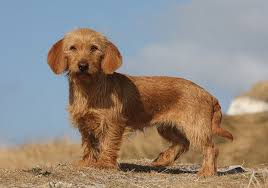
Basset Fauve de Bretagne
Conditions of detention
Basset Fauve de Bretagnes are adaptable and can live comfortably in both urban and rural environments. They do well in homes with access to a yard or nearby parks.
Useful Fact: They require regular exercise to stay healthy and happy, making daily walks and playtime essential.
Nutrition and diet
A balanced diet with high-quality dog food that includes proteins, fats, and carbohydrates is crucial for the Basset Fauve de Bretagne. Fresh meat, vegetables, and grains can be added to their diet.
Useful Fact: Monitoring their weight is important to prevent obesity, a common issue in this breed due to their love for food.
Health
Basset Fauve de Bretagnes are generally healthy but can be prone to certain health issues like hip dysplasia, ear infections, and obesity. Regular veterinary check-ups are important.
Useful Fact: Regular ear cleaning is essential to prevent infections, especially due to their long, drooping ears.
Grooming and care
The Basset Fauve de Bretagne has a wiry, rough coat that requires regular grooming to prevent matting and tangling. Brushing several times a week and occasional baths are recommended.
Useful Fact: Their coat is relatively low-maintenance but benefits from regular trimming to keep it neat and tidy
Education and training
Basset Fauve de Bretagnes are intelligent and eager to please, making them relatively easy to train. Early socialization and consistent, positive reinforcement training methods are crucial.
Useful Fact: They have a strong prey drive, so training them to respond to recall commands is particularly important.
Toys and entertainment
Interactive toys, puzzle games, and activities that engage their hunting instincts are excellent for keeping a Basset Fauve de Bretagne entertained.
Useful Fact: They enjoy scent-based games and exercises, which cater to their natural tracking abilities.
Safety
A secure, fenced yard is important for Basset Fauve de Bretagnes to prevent them from wandering off while exploring scents. Supervision during outdoor activities is recommended.
Useful Fact: Their strong hunting instinct means they should be kept on a leash in unsecured areas to prevent them from chasing small animals.
Accessories
Sturdy collars and leashes, comfortable bedding, and grooming tools are essential accessories for a Basset Fauve de Bretagne. Crate training can also be beneficial for travel and safety.
Useful Fact: Reflective gear enhances safety during evening or early morning walks.
Socialization
Early and ongoing socialization with other dogs, animals, and people is important for Basset Fauve de Bretagnes. It helps them develop a well-rounded temperament.
Useful Fact: Regular socialization helps prevent shyness or aggression and ensures they are friendly and adaptable in various situations.
Travel and Transportation
Basset Fauve de Bretagnes can adapt to travel if introduced gradually. Secure crates or harnesses in vehicles ensure their safety during trips.
Useful Fact: Bringing familiar items, such as their favorite blanket or toy, can help reduce travel anxiety.
Behavior and psychology
Basset Fauve de Bretagnes are known for their friendly, playful, and determined nature. They require regular mental and physical stimulation to prevent boredom and destructive behavior.
Useful Fact: Their loyalty and close bond with their family make them excellent companions, but they can exhibit some independence.
Legal aspects
Owners should be aware of local regulations regarding pet ownership, including licensing, leash laws, and specific breed regulations.
Useful Fact: Keeping vaccination records and adhering to local pet laws ensures the safety and legality of owning a Basset Fauve de Bretagne.


